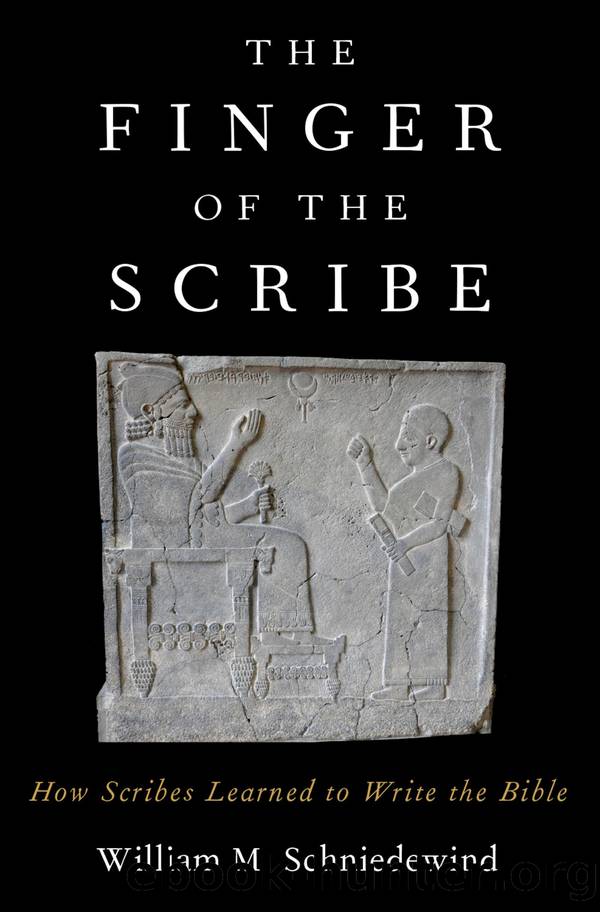The Finger of the Scribe by William M. Schniedewind

Author:William M. Schniedewind
Language: eng
Format: epub
Publisher: Oxford University Press
Published: 2019-07-15T00:00:00+00:00
Ps 20:5 ytn lk klbbk, “He shall give to you according to your desire”
Ps 37:21 ṣdyq ḥwnn wnwtn, “the righteous is generous and gives”
Ps 37:26 kl hywm ḥwnn wmlwh, “he is always generous and lends”
Ps 112:5 ṭwb ʾyš ḥwnn wmlwh, “all goes well with the man who lends generously”
We may imagine that such language would have been learned and memorized from school exercises, then applied in a variety of literary contexts. The example from Ps 112, which is an acrostic psalm, might itself have its origins as an adapted school exercise (see chapter 3).
Arguably, the most striking parallel to the Kuntillet ʿAjrud wisdom saying is Psalm 20:5. First, as a whole, Psalm 20 may have originally been a northern psalm as it appeals to the “God of Jacob.” This, of course, is notable given the northern traits of the site of Kuntillet ʿAjrud and its inscriptions, although the psalm was edited and revised for the Judean psalter. It also has some salient motifs that point to its use in royal liturgy.5 For example, the psalm ends with the enjoinder, “O Yahweh, give victory to the king!” (verse 10a [English, 9a]). This is also significant given the royal motifs in the iconography of the Kuntillet ʿAjrud drawings, as well as the apparent mention of a king in one of the letter templates (KA 3.1).
The combination of the letter genre with a different scribal exercise is paralleled in one school tablet from Ugarit, KTU 5.9. This example was already discussed in chapter 5 in the context of letters, particularly with regard to the introductory formulae. In this context, the body of Ugaritic practice letter becomes our focus. After the introduction, the letter (lines 7–16) presents a reciprocal saying (“a request, I request”) followed by a humorous grammatical exercise (e.g., using the verbal forms of the word ytn, “to give”): “And may he give it to his brother, to his friend, an eternal friend. May you give, and give! And may you indeed give, and would you not give? Give a cup of wine, and I shall drink it.” The content of an actual letter, unlike its introduction, must be completely flexible, depending as it does on the situation and circumstances. This opens up the possibility of attaching the playful student exercise that we find in KTU 5.9, or adding a pious proverbial saying as we find in the Kuntillet ʿAjrud example. What is relevant here is the way the genre of a letter allows the student to adapt the body of the letter to various types of practice.
The proverbial saying in KA 3.9 is more significant than first meets the eye. In this particular case, such sayings were learned by scribes and employed especially in diplomatic correspondence (although they could be adapted and used for various purposes). Once we recognize the pattern, we can adduce further parallels. For example, scholars have long noted certain correlations between the liturgical contexts in the biblical Psalms and the Amarna diplomatic corpus.6 One example is Ps 21:3 (Eng.
Download
This site does not store any files on its server. We only index and link to content provided by other sites. Please contact the content providers to delete copyright contents if any and email us, we'll remove relevant links or contents immediately.
| Haggadah | Hasidism |
| History | Holidays |
| Jewish Life | Kabbalah & Mysticism |
| Law | Movements |
| Prayerbooks | Sacred Writings |
| Sermons | Theology |
| Women & Judaism |
The Power of Habit by Charles Duhigg(3125)
Man's Search for Meaning by Viktor E. Frankl(2667)
Mckeown, Greg - Essentialism: The Disciplined Pursuit of Less by Mckeown Greg(2427)
MOSES THE EGYPTIAN by Jan Assmann(2411)
Devil, The by Almond Philip C(2324)
The Complete Dead Sea Scrolls in English (7th Edition) (Penguin Classics) by Geza Vermes(2270)
Unbound by Arlene Stein(2267)
I Capture the Castle by Dodie Smith(2034)
Schindler's Ark by Thomas Keneally(1876)
The Invisible Wall by Harry Bernstein(1799)
The Gnostic Gospel of St. Thomas by Tau Malachi(1782)
The Bible Doesn't Say That by Dr. Joel M. Hoffman(1676)
The Secret Doctrine of the Kabbalah by Leonora Leet(1601)
Political Theology by Carl Schmitt(1577)
The Jewish State by Theodor Herzl(1533)
A History of the Jews by Max I. Dimont(1523)
The Dead Sea Scrolls Bible by Martin G. Abegg(1508)
The Book of Separation by Tova Mirvis(1485)
Oy!: The Ultimate Book of Jewish Jokes by David Minkoff(1361)
